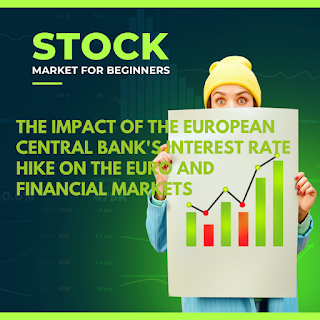The European Central Bank has just increased its Main Refinancing Rate from 2.50% up to 3.00%. In addition, the central bank has published its Monetary Policy Statement. Note that the management of the ECB is set to host a Press Conference at 13:45 GMT. The journalist question and answer section usually create major Euro volatility.
What does this mean for the Euro?
The ECB's decision to increase rates is a direct response to the recent pickup in inflation in the Eurozone. Inflation has been on the rise since the beginning of the year, and is now well above the ECB's target of 2%.
The ECB is worried that if inflation continues to increase, it could become difficult to control. As a result, they have decided to take action now in order to prevent inflation from getting out of hand.
The rate increase is also a signal that the ECB is preparing to start winding down its massive stimulus program. The program has been in place for over three years and has helped to prop up the Eurozone economy.
Now that the economy is improving, the ECB feels that it is time to start withdrawing some of the support. This could lead to further euro weakness in the short-term.
What does this mean for the markets?
The ECB's rate decision is likely to cause volatility in the markets. The main impact will be on the euro and European stocks.
The euro is already under pressure from the strong US dollar. The rate increase is likely to add to this pressure and could push the euro lower.
European stocks could also come under pressure as the rate increase makes it more expensive to borrow money. This could lead to a sell-off in the markets.
The ECB's decision is likely to have a major impact on the markets today. traders and investors will be closely watching the ECB's press conference for more clues on the future direction of monetary policy.
-The European Central Bank Increases Its Main Refinancing Rate
The European Central Bank (ECB) has just announced an increase in its main refinancing rate from 2.50% up to 3.00%. This is the first time in over seven years that the ECB has increased rates, and the move was widely expected by economists and market participants. The ECB has also published its Monetary Policy Statement, which provides more details on the rationale behind the rate hike.
The ECB's decision to raise rates is based on the improving economic conditions in the Eurozone. Inflation has been rising steadily in recent months and is now well above the ECB's target of 2%. The ECB believes that this higher inflation is due to temporary factors, and that it will eventually fall back to target. However, in the meantime, the ECB wants to prevent inflation from getting out of control.
The ECB's rate hike will have a direct impact on borrowing costs in the Eurozone. Interest rates on loans and mortgages are likely to rise, which could put a damper on economic activity. The ECB will be closely monitoring economic data in the coming months to see how the rate hike affects the economy.
-The European Central Bank's Monetary Policy Statement
The European Central Bank (ECB) has just announced an increase in its main refinancing rate from 2.50% up to 3.00%. This is the first time in almost a decade that the ECB has hiked rates, and it comes as a bit of a surprise given the recent slowdown in Eurozone economic growth. In addition to the rate hike, the ECB has also published its Monetary Policy Statement.
The main purpose of the ECB's monetary policy is to maintain price stability in the Eurozone. In order to do this, the ECB sets interest rates and implements other measures to influence the level of money and credit in the economy. The recent increase in the refinancing rate is intended to help cool inflationary pressures in the Eurozone, which have been building up in recent months.
The ECB's monetary policy decisions are always closely watched by financial markets, and today's announcement is likely to cause some volatility in the Euro. The ECB is set to hold a press conference at 13:45 GMT, during which President Mario Draghi will answer questions from journalists. This could provide some further insight into the ECB's thinking on monetary policy.
-Management of the ECB to Host a Press Conference
The European Central Bank has just increased its Main Refinancing Rate from 2.50% up to 3.00%. This is the first interest rate hike in the Eurozone since 2011. The ECB has also published its Monetary Policy Statement. The management of the ECB is set to host a Press Conference at 13:45 GMT. The journalist question and answer section usually create major Euro volatility.
-Journalist Questions and Answers Create Major Euro Volatility
The European Central Bank has just increased its Main Refinancing Rate from 2.50% up to 3.00%. In addition, the central bank has published its Monetary Policy Statement. Note that the management of the ECB is set to host a Press Conference at 13:45 GMT. The journalist question and answer section usually create major Euro volatility.
The ECB's decision to raise rates is widely expected to cause the Euro to strengthen against other currencies. However, the details of the ECB's statement and the questions that journalists put to the ECB management during the press conference could cause significant volatility in the Euro.
Investors will be watching closely to see how the ECB justifies its decision to raise rates and what its plans are for future policy tightening. If the ECB sounds hawkish, then the Euro is likely to strengthen further. However, if the ECB sounds dovish, then the Euro could come under pressure.


%20is%20a%20rapidly%20growing%20field%20that%20is%20transforming%20the%20way%20we%20live%20and%20work..png)
